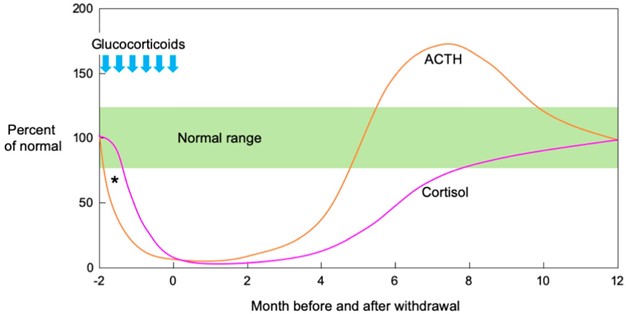A patient is in an urgent care center with an acute asthma attack. The nurse expects which medication will be used for initial treatment.
A long-acting beta2 agonist such as salmeterol (Serevent)
A short-acting (rapid-acting) beta2 agonist such as Albuterol (Proventil)
A corticosteroid such as fluticasone (Flovent)
An anticholinergic such as ipratropium (Atrovent)
The Correct Answer is B
During an acute asthma attack, the airways become narrowed and inflamed, leading to symptoms such as wheezing, shortness of breath, and chest tightness. Short-acting beta2 agonists like Albuterol are the first-line medication for relieving acute asthma symptoms. They work by quickly relaxing the smooth muscles in the airways, resulting in bronchodilation and improved airflow. Albuterol provides rapid relief of symptoms and is often administered via inhalation.
A. Long-acting beta2 agonists (e.g., salmeterol) are typically used as maintenance therapy for long-term control of asthma symptoms, rather than for immediate relief during an acute attack.
C. Corticosteroids (e.g., fluticasone) are anti-inflammatory medications that are often prescribed for asthma, but they are more commonly used as part of a long-term management plan and may not provide immediate relief during an acute attack.
D. Anticholinergics (e.g., ipratropium) are sometimes used in combination with short-acting beta2 agonists for acute asthma exacerbations, but they are not typically the initial treatment choice for an acute asthma attack.
Nursing Test Bank
Naxlex Comprehensive Predictor Exams
Related Questions
Correct Answer is D
Explanation
Diphenhydramine is an antihistamine medication that can cause sedation as a side effect. Taking most of the daily dose at bedtime can help minimize daytime sedation. By taking the medication closer to bedtime, the sedative effects are more likely to occur during sleep, reducing the impact of sedation during waking hours.
The other options mentioned are not effective strategies to minimize daytime sedation caused by diphenhydramine:
A. "Distribute the doses evenly throughout the day": This approach may lead to a consistent level of sedation throughout the day and may not effectively minimize daytime sedation.
B. "Gradually decrease the dose once tolerance to the effect is reached": Gradually decreasing the dose of diphenhydramine is not a recommended strategy for minimizing daytime sedation. It is important to follow the prescribed dose and consult with a healthcare provider before making any changes to the medication regimen.
C. "Take the medication with meals": Taking diphenhydramine with meals may help reduce the risk of stomach upset but does not directly address the issue of daytime sedation.
Correct Answer is C
Explanation
Prednisone is a corticosteroid medication commonly used to treat asthma and other inflammatory conditions. When taken for a prolonged period at higher doses, it can suppress the body's natural production of cortisol, a hormone produced by the adrenal glands. Abruptly stopping prednisone after long-term use can lead to adrenocortical insufficiency, also known as adrenal insufficiency or adrenal crisis.
Adrenocortical insufficiency occurs because the body's adrenal glands need time to resume normal cortisol production after being suppressed by prednisone. Gradually reducing the dose of prednisone allows the adrenal glands to gradually increase their cortisol production, minimizing the risk of adrenal insufficiency.
Rebound pulmonary congestion, hyperglycemia, and severe dehydration are not specific adverse effects associated with discontinuing prednisone. However, it is important for clients who have been taking prednisone to follow their healthcare provider's instructions regarding the tapering schedule and any potential risks or side effects.

Whether you are a student looking to ace your exams or a practicing nurse seeking to enhance your expertise , our nursing education contents will empower you with the confidence and competence to make a difference in the lives of patients and become a respected leader in the healthcare field.
Visit Naxlex, invest in your future and unlock endless possibilities with our unparalleled nursing education contents today
Report Wrong Answer on the Current Question
Do you disagree with the answer? If yes, what is your expected answer? Explain.
Kindly be descriptive with the issue you are facing.
